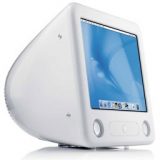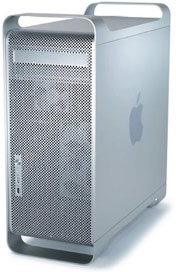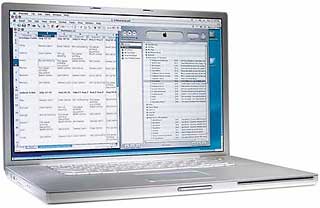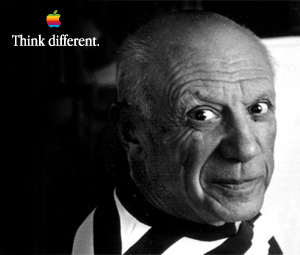Nearly a decade has has passed since the last run of PowerPC Macs hit Apple’s store shelves and provided us with one last hurrah on “thinking different” and being part of the trope of “crazy ones” who simply would not conform to the norm.
The Think Different campaign meant a lot to those who hold Apple near and dear and balked changing things just to fit in. The fact that Macs had run PowerPC processors versus Intel or AMD CPUs for so long kept a true point of difference and made Macs unique and unable to run Windows natively (emulation only).
As fate would have it though, just as unthinkable as it was for Steve Jobs to help bring improved versions of Microsoft Office to the Mac shortly after his return and accept an investment of $150 Million from the corporate giant out of Redmond (which many Mac die-hards despised for years), Macs would abandon PowerPC processors in favor of Intel.
No longer did it seem that Macs were “thinking different”. At the time it really felt as if Apple had conceded to be more or less like Windows machines, allowing Windows to run natively on the Mac due to the change in architecture.
PowerPC Goes Out with a Bang
The last gasp of notable Macs maintaining the PowerPC chips came around this time or were just discontinued at this time ten years ago, but are still among the favorites for Mac collectors (see key feature below each Mac that sets it apart).
1.42 GHz eMac G4 – discontinued 10/12/2005

Key Feature: Had a 64 MB Radeon 9600 (instead of the Radeon 9200 from the 2004 model), making it the only eMac with Core Image capabilities
17″ and 20″ iMac G5 iSight – introduced 10/12/2005

Key Feature: integrated iSight camera and Iinfrared (IR) receiver, making this the only PowerPC Mac with built-in iSight, hence the “iSight” moniker for this iMac
Power Mac G5 Quad – announced 10/19/2005 and shipped November 2005

Key Feature: Fastest PowerPC Mac ever made and the only PowerPC Mac made (aside from the Daystar Genesis clone) to ship with 4 cores.
Additionally, Apple made 2.0 GHz and 2.3 GHz Power Mac G5 Dual models for those who didn’t need quad-core power.
Hi-Res PowerBook G4 – shipped 10/19/2005

Oddly, but perhaps most importantly, the 1.67 GHz Hi-Res PowerBook G4 that shipped out 10/19/2005 – a mere three months before it would be discontinued in favor of the original 1.83 GHz Core Duo MacBook Pro: 15″ model – A1138 or M9969LL/A and its “big brother” counterpart 17″ model – A1139 or M9970LL/A
Key Feature: Only 15″ PowerBook G4 with combined 3.5mm Optical/Analog audio input/output jack (17″ had this feature on the 1.5 GHz in addition to 1.67 GHz).
 Note: The 12″ PowerBook G4 1.5 GHz endured much longer than all the rest of the PowerPC line. It hung around until May 2006, stepping aside with the arrival of the polycarbonate white MacBook) due to the fact that no small form factor MacBook or MacBook Pro was released initially alongside the 15″ MacBook Pro in January 2006.
Note: The 12″ PowerBook G4 1.5 GHz endured much longer than all the rest of the PowerPC line. It hung around until May 2006, stepping aside with the arrival of the polycarbonate white MacBook) due to the fact that no small form factor MacBook or MacBook Pro was released initially alongside the 15″ MacBook Pro in January 2006.
These Macs were the pinnacle of their lines and still can command a premium on eBay and other secondhand markets. I personally had the pleasure of owning a 15″ Hi-Res PowerBook G4 and still have a 12″ 1.5 GHz PowerBook G4 and 1.42 GHz eMac G4 in my collection. All of these Macs are still somewhat viable today as web browsers with TenFourFox, video editing stations with iMovie HD ’06, and could even be decent candidates for MorphOS (a third party operating system that is still currently developed for PowerPC Macs).
The Power Mac G5 Quad was more powerful than most “consumer” Intel Macs (Mac Minis, iMac, MacBooks) from 2006 through 2008, with an average Geekbench 2 score in the 3300 to 3600 range. During this time, only the Mac Pro was technically more powerful on paper, but even then (at least early on), many Mac OS X applications were optimized for PowerPC (and not Intel), giving the G5 Quad a significant advantage.
Tiger or Leopard?
Every single one of these aforementioned Macs that shipped in 2005 came with Mac OS X 10.4 Tiger installation media and could utilize the 10.4.6 retail installation DVD. Tiger is generally considered the very best version of Mac OS X produced for the PowerPC. It was truly optimized for the PowerPC G4 and G5 in all aspects (even runs great on G3s) and is significantly smoother than Mac OS X 10.3 Panther on systems that support Tiger when provided with ample RAM.
Mac OS X 10.5 Leopard arrived in 2007, and by that time Intel Macs had displaced all PowerPCs in retail and online outlets (save for clearance and refurbished), but a time of “crossover” existed and allowed both developers and Apple themselves a chance to ween us off of PowerPC gear and PowerPC applications. Apple shipped Leopard on a dual-layer DVD (a first); it was the first and last true “Universal Binary” operating system for PowerPC and Intel Macs.
Note: Although Tiger was also developed for Intel, only Leopard had installation assets for both Intel and PowerPC Macs on the same disc.
At this point, which OS should you run on these late model PowerPC Macs? The short and simple answer: both!
Why?
I could get into a multitude of reasons, but I will keep it down to the two biggest key features that don’t exist on both versions: Classic Mode exists in Tiger only, and Time Machine exists in Leopard only. You can partition your Mac to run both versions of Mac OS X or have multiple boot disks and then boot into Tiger when you want to take advantage of old OS 9 applications that run quite well in Classic Mode and then switch over to Leopard when you want to run a full Time Machine backup (including Tiger partitions/disks).
The key is RAM though – all of these Macs are more than capable of running Leopard and support at least 2 GB of RAM. Make sure you have a minimum of 1 GB of RAM to comfortably run Leopard, but anything more than that is better to allow you more breathing room for multitasking.
Collectible Today
These Macs are becoming sought after for the very reason that they were the pinnacle of their lines and still have limited viability due to the ability to run Leopard rather smoothly.
- Hi-Res PowerBooks in excellent condition still command $200 to $500 eBay prices.
- G5 Quads sell for as much (if not more) than a Mac Pro 1,1, even though a Mac Pro 1,1 can be heavily upgraded with 8 CPU cores and modern GPUs (blowing away a Quad) and can be tricked to run a modern build of OS X.
- Even the eMac G4 1.42 GHz iMac G5 iSight can grab $100.
- The 12″ PowerBook G4 is probably the biggest sleeper of them all. It’s still my favorite sub-compact Mac in the past decade and has more connectivity options than all subsequent subcompacts to this day.
If you can find one of these machines with original box, manuals, and accessories in excellent to mint condition, hang on tight. They will continue to appreciate and be more and more sought after by collectors. They are true low-end Macs!
Keywords: #lastpowerpcmacs #powermacg5quad #hirespowerbookg4
Short link: http://goo.gl/jquV0P
searchword: lastpowerpcmacs



